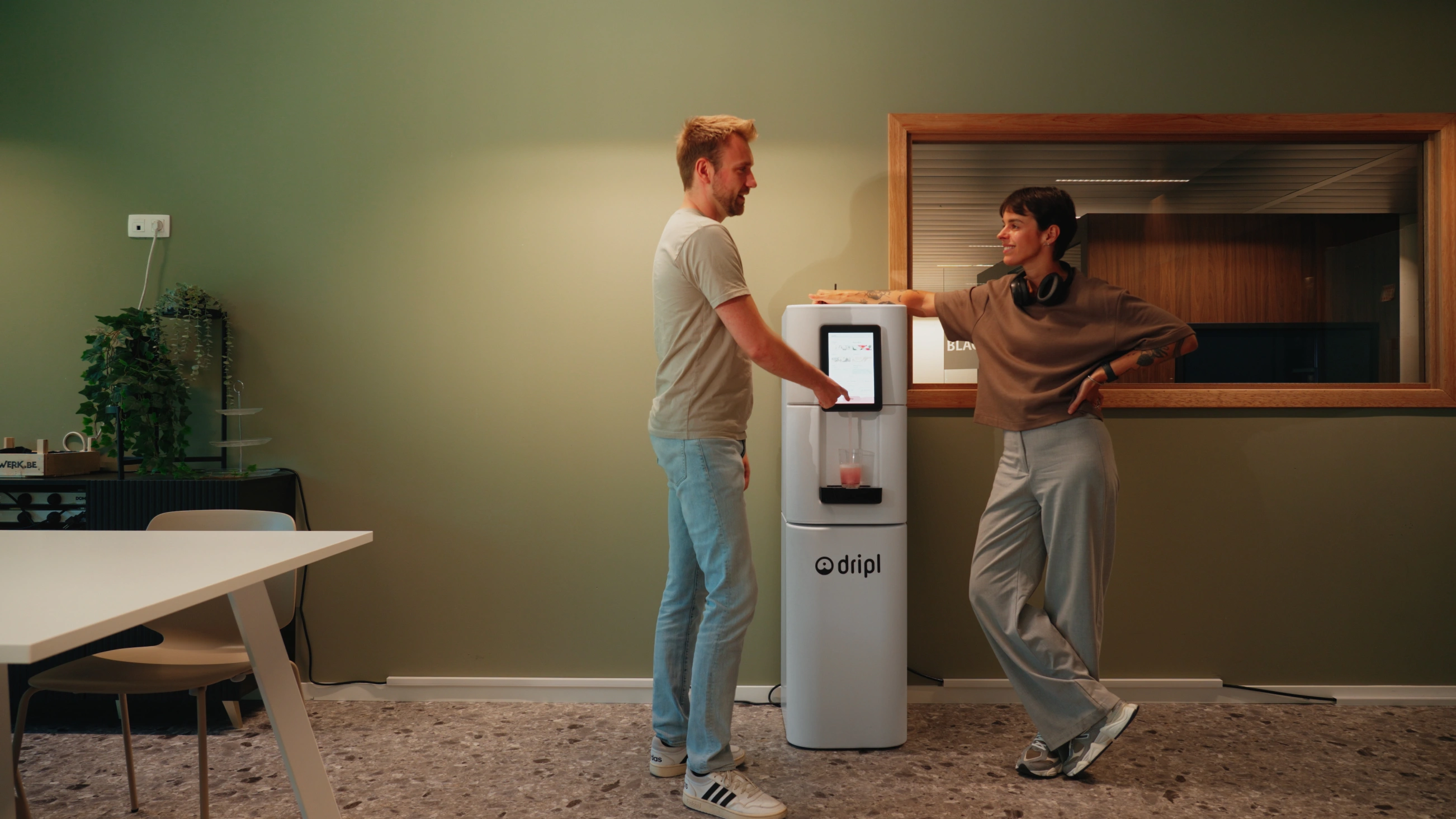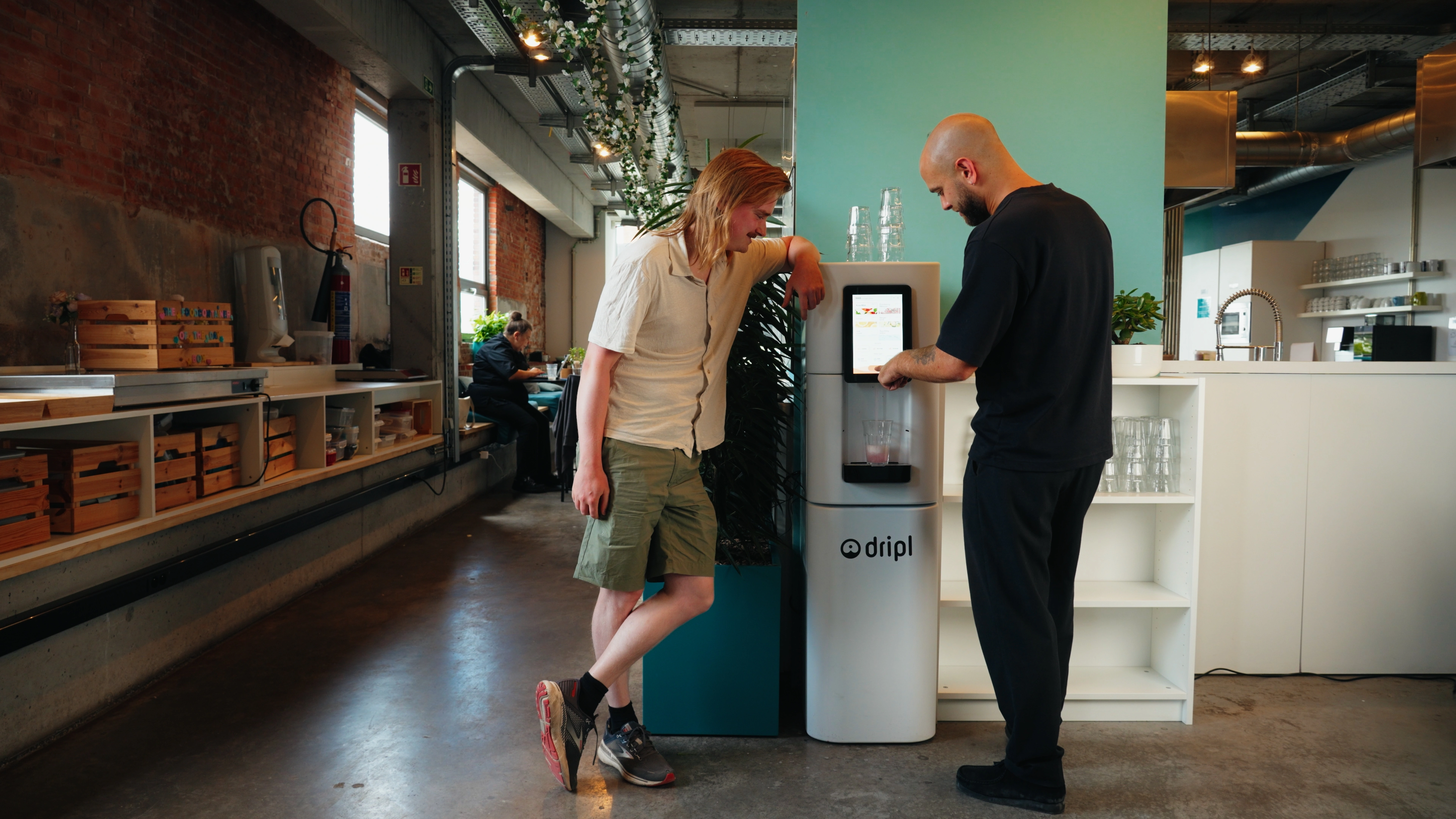All blog posts
Belgians worry about microplastics - River Cleanup x Dripl

A few months ago, River Cleanup launched a survey of more than 1,000 Belgians about their awareness and attitude regarding plastic pollution. That the results are surprising is the least that can be said about them. Thomas De Groote (CEO River Cleanup) and Colin Deblonde (CEO Dripl) sit down together at to explain all the results. Why are so many Belgians still dumping? How come the average Belgian doesn't really know what microplastics are? Can a sustainable office be a small step in the right direction?
Concern around microplastics is more than justified
In the survey, River Cleanup asks 1,000 Belgians which environmental problems they believe have the greatest impact on our society. In this, air pollution is by far number one (70%), yet it is closely followed by plastic pollution (61%) and water pollution (61%) with a shared second place. So we are clearly concerned about plastic issues, yet 68% of Belgians underestimate how much plastic ends up in our oceans each year. Spoiler alert - according to Plastic Soup Foundation, this amounts to 11 million tons.
However, knowledge on this subject could be a lot better. When asked exactly what microplastics are, 53% of Belgians do not have a direct answer. Nevertheless, 75% of Belgians are convinced that they are harmful.
That concern is only right. According to research, some 170,000 billion pieces of microplastics are currently floating on the surface of our oceans. Those bits are released from clothing, are in cosmetics, you name it. Right now, we are all consuming the equivalent of a bank card in microplastics per week. The consequences are not 100% clear yet, but accumulation can lead to chronic inflammation and they can penetrate our tissues.
Plastic avoidance prevails over recycling
Of course, as discussed at length in our interview with Karin Van Doorsselaer, recycling is not the first solution. "The essence of packaging is to protect the product; if products are lost, the impact is even greater," Karine echoed. "The next step is to apply the principles of the circular economy. Being initially reuse and ultimately recycling."
Fortunately, the figures from River Cleanup's survey give hope. More than 62% of Belgians are willing to actively start changing their behavior. Maybe we should start by drinking more tap water? Anno 2023, 2 out of 3 Belgians still buy water in plastic bottles instead of drinking tap water. Yet 77% of consumers look to companies and supermarkets to change this. However, this small adjustment can save a family of four up to 1200 euros per year and you have 30 PMD bags less per year. And aren't they already costing a lot of money?
More surprising statistics
- Belgians consider plastic pollution the 2nd most impactful environmental problem, after air pollution
- 1 in 3 Belgians (among young people even 1 in 2 Belgians) think they themselves can do little to combat plastic pollution
- Nearly 1 in 4 Belgians (22%) admit to leaving litter behind
- 2 in 3 drink water from plastic bottles instead of tap water
- 28% of Belgians do not sort PMD at work, 8% do not sort there at all
- On average, Belgians think only 50% of PMD bag is recycled
A sustainable office is already a big step
So small changes can make a world of difference. Recent research by Dripl together with independent research firm iVox shows that 50% of working Belgians are still offered too much disposable packaging at work. So why not start there?
More than half of employees prefer a sustainable office. Moreover, we're increasingly considering the role of our company in society. How sustainable is my office? Does it contribute to society? Meanwhile, since COVID and the energy crisis, employers are increasingly considering the costs of corporate social responsibility. Fortunately, numerous solutions intersect with these trends. For example, it's easy to offer healthy, unpackaged snacks in the office or we're tempted to say, healthy drinks.
About River Cleanup
River Cleanup started in 2017 with a 10-minute cleanup and grew into an international organization with 190,000 volunteers active in 89 countries. The Belgian nonprofit aims to stop plastic before it reaches our oceans by cleaning up rivers, changing behavior and transforming organizations. Partners include AB Safety, A.S.Adventure, Boma, Delhaize, Keytrade Bank, Multi Masters Group, and Volkswagen Belgium. One way you can support them is through donations or by cleaning up in your neighborhood for ten minutes yourself. With one euro, they can fix one kilo of plastic from our oceans. More info on their website.

A few months ago, River Cleanup launched a survey of more than 1,000 Belgians about their awareness and attitude regarding plastic pollution. That the results are surprising is the least that can be said about them. Thomas De Groote (CEO River Cleanup) and Colin Deblonde (CEO Dripl) sit down together at to explain all the results. Why are so many Belgians still dumping? How come the average Belgian doesn't really know what microplastics are? Can a sustainable office be a small step in the right direction?
Concern around microplastics is more than justified
In the survey, River Cleanup asks 1,000 Belgians which environmental problems they believe have the greatest impact on our society. In this, air pollution is by far number one (70%), yet it is closely followed by plastic pollution (61%) and water pollution (61%) with a shared second place. So we are clearly concerned about plastic issues, yet 68% of Belgians underestimate how much plastic ends up in our oceans each year. Spoiler alert - according to Plastic Soup Foundation, this amounts to 11 million tons.
However, knowledge on this subject could be a lot better. When asked exactly what microplastics are, 53% of Belgians do not have a direct answer. Nevertheless, 75% of Belgians are convinced that they are harmful.
That concern is only right. According to research, some 170,000 billion pieces of microplastics are currently floating on the surface of our oceans. Those bits are released from clothing, are in cosmetics, you name it. Right now, we are all consuming the equivalent of a bank card in microplastics per week. The consequences are not 100% clear yet, but accumulation can lead to chronic inflammation and they can penetrate our tissues.
Plastic avoidance prevails over recycling
Of course, as discussed at length in our interview with Karin Van Doorsselaer, recycling is not the first solution. "The essence of packaging is to protect the product; if products are lost, the impact is even greater," Karine echoed. "The next step is to apply the principles of the circular economy. Being initially reuse and ultimately recycling."
Fortunately, the figures from River Cleanup's survey give hope. More than 62% of Belgians are willing to actively start changing their behavior. Maybe we should start by drinking more tap water? Anno 2023, 2 out of 3 Belgians still buy water in plastic bottles instead of drinking tap water. Yet 77% of consumers look to companies and supermarkets to change this. However, this small adjustment can save a family of four up to 1200 euros per year and you have 30 PMD bags less per year. And aren't they already costing a lot of money?
More surprising statistics
- Belgians consider plastic pollution the 2nd most impactful environmental problem, after air pollution
- 1 in 3 Belgians (among young people even 1 in 2 Belgians) think they themselves can do little to combat plastic pollution
- Nearly 1 in 4 Belgians (22%) admit to leaving litter behind
- 2 in 3 drink water from plastic bottles instead of tap water
- 28% of Belgians do not sort PMD at work, 8% do not sort there at all
- On average, Belgians think only 50% of PMD bag is recycled
A sustainable office is already a big step
So small changes can make a world of difference. Recent research by Dripl together with independent research firm iVox shows that 50% of working Belgians are still offered too much disposable packaging at work. So why not start there?
More than half of employees prefer a sustainable office. Moreover, we're increasingly considering the role of our company in society. How sustainable is my office? Does it contribute to society? Meanwhile, since COVID and the energy crisis, employers are increasingly considering the costs of corporate social responsibility. Fortunately, numerous solutions intersect with these trends. For example, it's easy to offer healthy, unpackaged snacks in the office or we're tempted to say, healthy drinks.
About River Cleanup
River Cleanup started in 2017 with a 10-minute cleanup and grew into an international organization with 190,000 volunteers active in 89 countries. The Belgian nonprofit aims to stop plastic before it reaches our oceans by cleaning up rivers, changing behavior and transforming organizations. Partners include AB Safety, A.S.Adventure, Boma, Delhaize, Keytrade Bank, Multi Masters Group, and Volkswagen Belgium. One way you can support them is through donations or by cleaning up in your neighborhood for ten minutes yourself. With one euro, they can fix one kilo of plastic from our oceans. More info on their website.
FAQs
Get your free quote
Get your personalised quote today. We’ll get back to you soon.




-min.png)